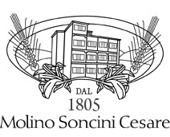FAQ Frequently Asked Questions about our work
FAQ
ENVIRONMENTAL IMPACT AND SUSTAINABILITY
We are particularly attentive to our impact on the environment, and so we try to minimise our energy consumption in the production of our flour. We have a very low water consumption and all our delivery trucks are full when they leave our facility (reducing both waste of fuel and pollution). Our packaging is all recyclable and we are constantly reducing the quantity of plastic used in the transportation of our products.
RECIPES
Our website, and those of our blogging partners, feature a range of authentic Italian recipes that feature our products, plus there are a number of videos (in Italian and English) that show exactly how our products can be used.
Technical characteristics
These values are produced by a specific piece of equipment called Chopin's Alveograph. A mix of flour and water is prepared, left for a specific period f time, and then placed in the alveograph, above a small hole that introduces air into the dough. This expands into a small ball, and the force needed to do so is measured by the machine, plotted as a curve: the W value is the area below the curve, the P/L value is ratio betweem the two axes. The greater the force needed to expand the dough - leading to a high curve - the greater the strength and protein-level of the flour (represented by a high W value). Similarly, the lower the P/L value, the more elastic the flour is.
Markets and package sizes
Our main market is food service (hotels, restaurants, pizzerias, cake-shops etc), and therefore most of our flours are available in 5kg and 25kg confections. We also produce a range of flours in 1kg packets, for supermarkets and retail.
DELIVERY AND PAYMENT
All our prices are ex-works from Porporano, Parma, Emilia-Romagna; prices for delivery obviously depend on size of the order and destination. We usually have a minimum business order of two pallets (pallet size: 80x120x160 cm, or EPAL on request). You can request information on these costs by sending an email to: export@molinosoncinicesare.com, specifying the products and quantities involved.
All our products are shipped via container trucks certified for transporting food, in order to maintain the correct levels of humidity and temperature necessary for flour.
We ship goods one week after payment has been received.
We currently supply flour all over the world: we have clients in the European Union, the USA, Canada, various Asian countries (China, Japan, India, the Philippines and Singapore), South Africa, countries across north Africa and Australia.
We request payment in advance via bank transfer. Our website allows our clients to pay in the maximum security, via credit card or PayPal.
QUALITY CONTROL AND CERTIFICATIONS
Every stage of the production process takes place at our mill near Porporano, from the arrival of the raw materials, through the cleaning, storage, washing and milling stages, to the post-milling procedures and packaging. Our warehouse has been specifically designed to allow for constant checking of temperature and humidity levels. The final products are loaded directly onto trucks suited for the transportation of food.
We are fully certified for HAACP, checked annually by the local health authority. Our site is visited regularly by local state health inspectors, and our on-site laboratory is inspected each year independent external consultants certified by the local heath authority. The microbiological aspects of our work are also checked, by an accredited external laboratory registered with the heath service. We are also currently working towards BRC certification.
Yes, we do use magnetic screening processes at our mill, but not X-ray machines or metal detectors. We employ the magnetic screens a number of times in each production process: when the raw materials are moved from the warehouse to be cleaned and washed; then when they are sifted before being siloed; again before packaging, and finally before being loaded into storage tanks.
A sample is taken from every delivery of raw materials that arrives at our mill before anything is unloaded. It is checked for humidity, cleanliness and impurities, protein levels, specific-weight, and presence of moulds and other contaminants, plus a “smell-check” (which provides a clear indication of the freshness of the material). Only once this sample has passed all these tests do we allow the raw materials to be unloaded and introduced into our milling facility. If we are not satisfied with any material that arrives at our mill, it is sent back.
Microbiological tests are carried out by an external agency accredited by the local health authority in Parma, but we also conduct our own microbiological tests for contamination, moulds, allergies, dust and ash. Via the AOAC method, we also check for the presence of hairs, feathers and other contaminants.
LABELLING AND EXPIRY-DATES
All our products comply with Italian and European labelling regulations. Each product carried its own specific lot number and best-before-date, advice for storage, a complete list of ingredients, allergen information and description of its chemical composition. You can download a detailed product data-sheet for each and every one of our products from our website.
Of course, even if the production of labels in languages other than Italian can impact on both the costs of production and delivery timescales.
LABELLING AND EXPIRY DATES
Our flours have a shelf-life of 9-12 months if correctly stored, as explained on each packet. The precise best-before-date is printed on each label.
RAW MATERIALS
All our raw materials are traceable, certificated and GM-free.
We choose our suppliers only after meeting them in person, so that we can be sure that their production facilities and procedures comply with Italian and European law. We generally visit our suppliers located in other parts of the European Union once a year and we work closely with all our suppliers to ensure that the high standards we expect are maintained.
